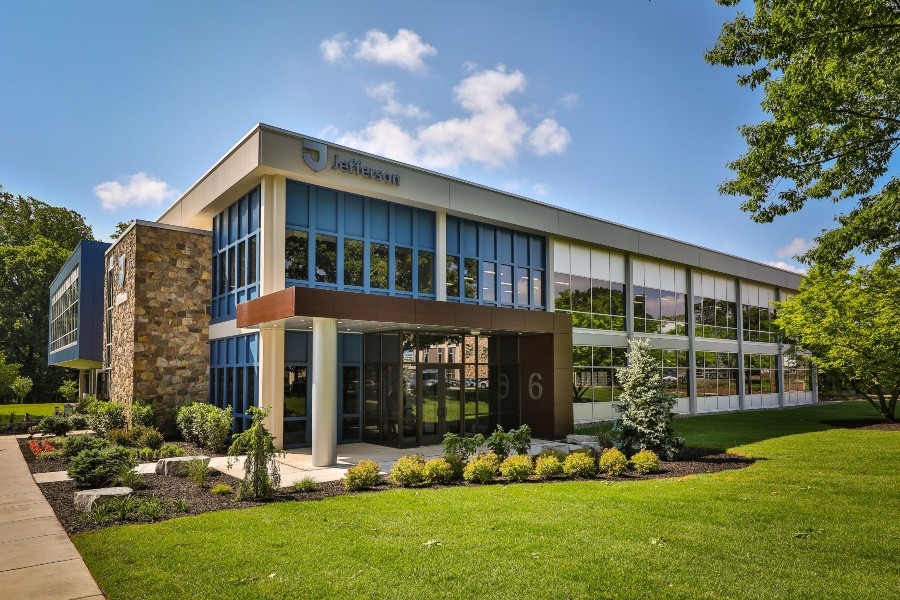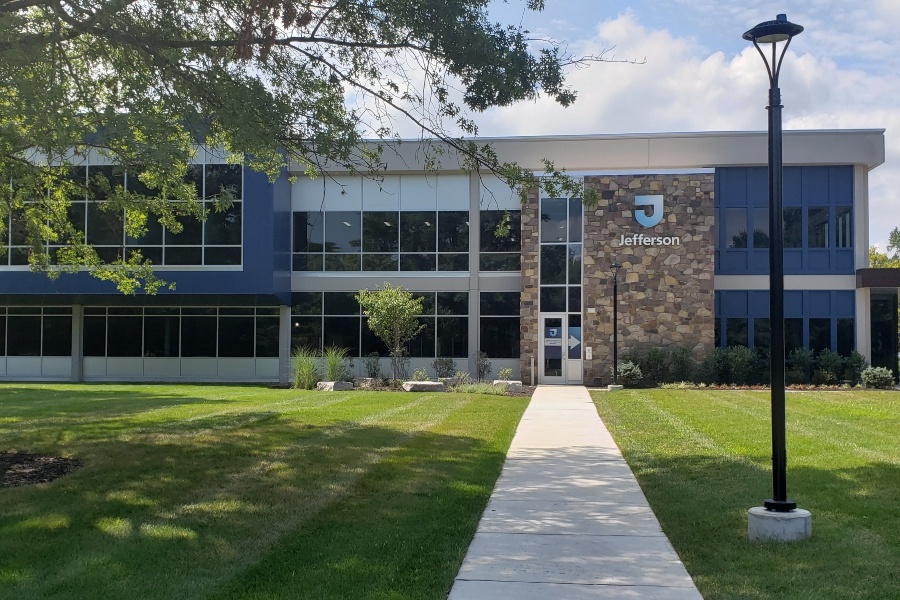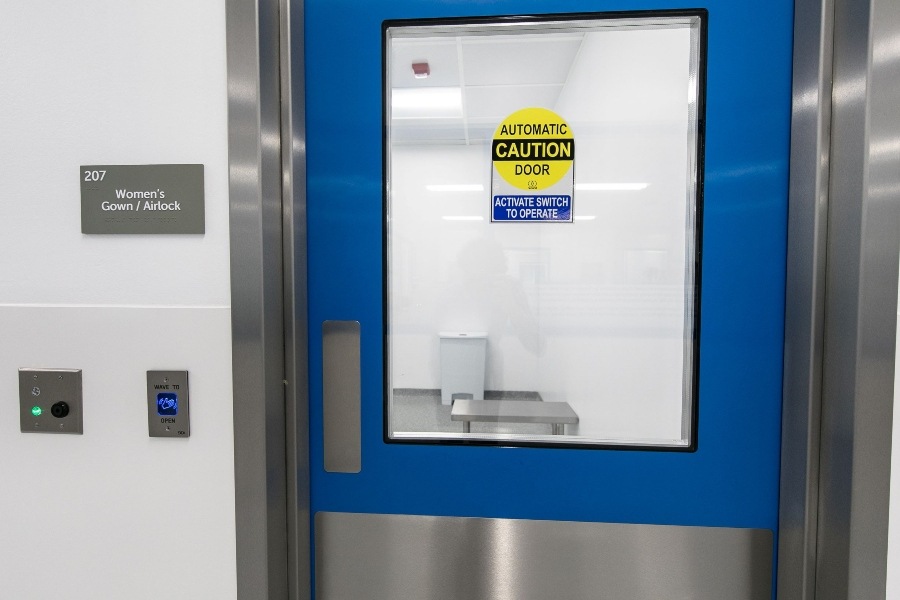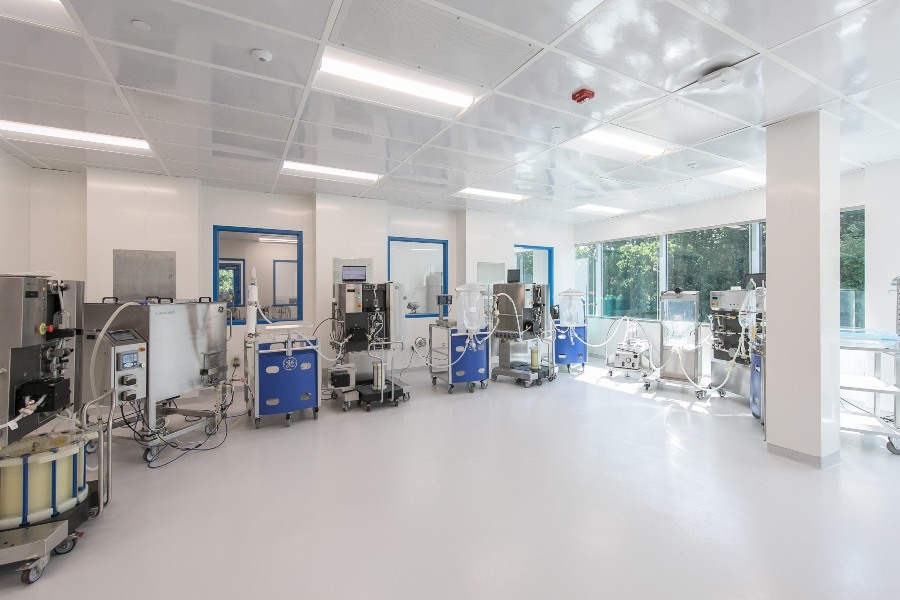Biotech Tour: Inside the New Jefferson Institute for Bioprocessing
The first-of-its-kind space boasts a 25,000-square-foot training facility and academic programs that could help close the local bioprocessing workforce gap.

The Jefferson Institute for Bioprocessing is located on the former Rohm & Haas research and development campus at 727 Norristown Road, in Spring House, Lower Gwynedd Township, Montgomery County, Pa. / Courtesy
In May, Thomas Jefferson University opened the doors to a Philadelphia first — the Jefferson Institute for Bioprocessing (JIB). With the potential to help fill the local workforce gap, JIB is the only bioprocessing training institute in the country where students can engage in a range of workshops, training and academic programs modeled after the National Institute for Bioprocessing Research and Training (NIBRT) curriculum, which is widely considered the gold standard for biopharmaceutical manufacturing education.
Demand for this kind of space is high. Today, biologic therapeutic drugs reel in more than $200 billion in annual global revenue and the market is expected to grow to over $380 billion by the end of 2019. And as demand for biologics and personalized medicine continues to grow, so does the need for a workforce that is prepared to take on new and emerging roles in the biomanufacturing industry. A recent survey by the NIBRT found that nearly 80 percent of the biopharma leaders surveyed had difficulty filling one or more positions in their facilities. Nearly half of those survey respondents said they had the most difficulty hiring trained bioprocess engineers.
Located in Spring House Innovation Park in Lower Gwynedd, Pennsylvania, the JIB gives scientists, engineers and technicians access to a state-of-the-art bioprocessing training facility where they can practice complex bioprocessing procedures using industry-grade equipment. NextHealth PHL recently took a tour of the facility with JIB executive director Parviz Shamlou to find out more about how Jefferson’s partnership with NIBRT could help bridge the biomanufacturing workforce gap. Here’s what we learned:

The Jefferson Institute for Bioprocessing is located on the former Rohm & Haas research and development campus at 727 Norristown Road, in Spring House, Lower Gwynedd Township, Montgomery County, Pa. / Queen Muse
Situated on the former Rohm & Haas research and development campus at 727 Norristown Road in Montgomery County, the JIB facility is one of eleven buildings on the 133-acre campus. The legacy manufacturing campus was rebranded as the Spring House Innovation Park in 2017 shortly after the local real estate development company, MRA Group, acquired it.
From the outside, the JIB has the appearance of a typical office park building. Inside you’ll find modern office space and a 25,000-square-foot biomanufacturing facility that rivals industry-standard spaces. Shamlou says the facility was intentionally designed to mimic Good Manufacturing Practice (GMP), a system for ensuring that products are consistently produced according to quality standards and minimizing the risk for error during pharmaceutical production.
“This is not a GMP facility because the products that trainees make here do not go on to be consumed by patients, but for all intents and purposes, we want our trainees to experience and act as if they’re in a real GMP facility,” Shamlou explained. “I always tell them, ‘You can go into this facility and make as many mistakes as you’d like.’ If they were to make mistakes like that in a real manufacturing facility, it could cost hundreds of millions of dollars. So, it’s crucial for them to have this space for trial and error.”

Visitors and trainees have to put on appropriate attire in airlocked gown rooms before entering the training facility. / Courtesy
Biomanufacturing is a meticulous process. Something as tiny as a cotton fiber from a shirt could contaminate an otherwise sterile lab space and possibly alter the final product, making it unfit for consumption. According to Shamlou, JIB trainees undergo a full day of training just to learn how to properly “gown-up” before entering the facility. As a visitor, I, too, had to don a hairnet, safety goggles, white coat, and shoe booties before I could even view the space.
“GMP manufacturing isn’t just about how to work, it’s about how to behave,” Shamlou said. “Simple mistakes lead to increased costs when people don’t know how to behave in a bioprocess facility.”

The Jefferson Institute for Bioprocessing features modern office spaces and a 25,000-square-foot biomanufacturing facility / Courtesy
Once I was fully gowned, we exited the air-locked gown room and entered the manufacturing lab. The facility features many of the tools and technologies that professionals use to make commercial therapies in traditional manufacturing spaces, but according to Shamlou, there are some intentional differences.
Unlike typical biomanufacturing operations that use stainless steel piping and parts, the JIB lab has single-use technology. The single-use parts come to the facility ready to use and can be discarded afterward, saving weeks that would typically be spent cleaning stainless steel parts in a traditional space.
“Our students will be trained on how to open and install single-use items and how to prepare the machines to do what they need to do,” Shamlou explained.

Among the equipment in the JIB lab are multiple bioreactors, ranging from 50 to 200 liters. Here, Parviz Shamlou shows the facility’s largest bioreactor. / Queen Muse
Among the equipment in the lab are multiple bioreactors, ranging from 50 to 200 liters in capacity. The industry standard bioreactor is 2,000 liters, which is much bigger than the machines at the JIB, but Shamlou says they all function exactly the same, regardless of size.
“Once you get trained on one of these and know how to handle the GMP environment, you can do it anywhere at any scale,” Shamlou said.
Another difference from a traditional biomanufacturing space is that all the machinery at the JIB is on wheels. In a traditional facility, the equipment is usually bolted to the floor. This again is a time-saving mechanism that allows trainees to simply wheel-in whatever equipment they need to perform a particular task and wheel it back out when the task is complete.
On the Horizon

JIB trainees get an opportunity to practice bioprocessing procedures on industry-grade equipment. This experience makes them better prepared to enter jobs in the biopharmaceutical industry. / Courtesy
The JIB currently offers a nine-month, 30-credit Master’s degree program in engineering with a focus in biopharmaceutical process development and a 12-credit graduate certificate in biopharmaceutical process development, as well as various specialized open enrollment training programs.
In the future, the JIB has plans to partner with local community colleges to analyze their existing programs, identify any gaps in the curriculum, and develop new, hands-on training programs to fill those gaps.
“Many community college students graduate with Associate’s degrees but still find it hard to get into jobs in the biopharmaceutical industry,” Shamlou explained. “Students who come through these programs at JIB will already have experience working with industry equipment and will be able to transition to jobs sooner.”
The JIB also has another 25,000-square-feet of building space that has yet to be developed. According to Shamlou, the space may be used to support another growing sector of the biopharmaceutical industry, cell and gene therapy.
“The vision for the first floor is to work on creating training programs for emerging gene and cell therapies and new vaccines,” Shamlou said. “Cell and gene therapy is another growing specialty that will soon need a specially-trained workforce to support its growth. We hope to train those future leaders here at the JIB.”


